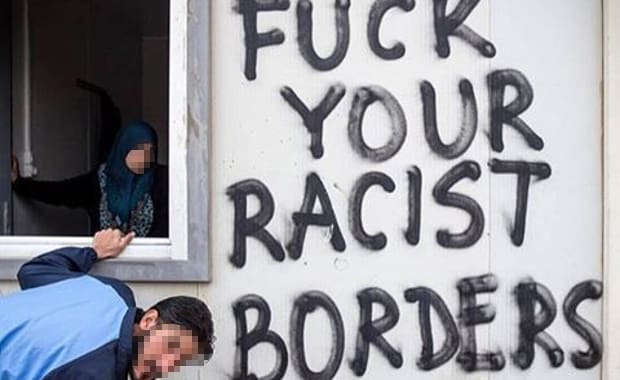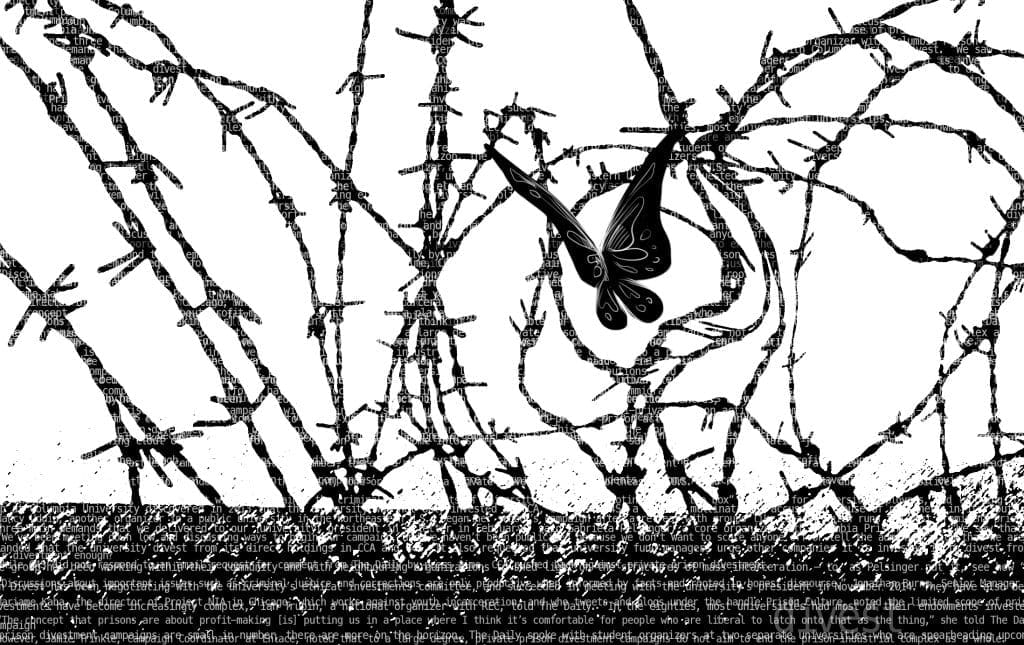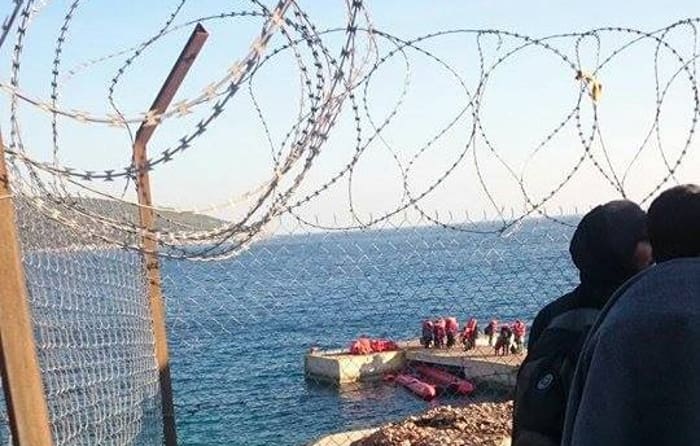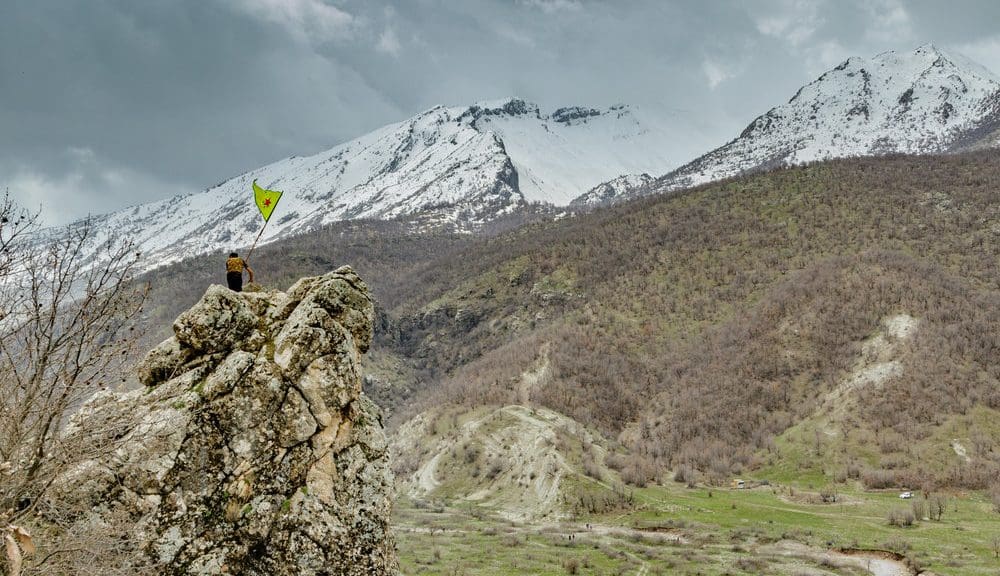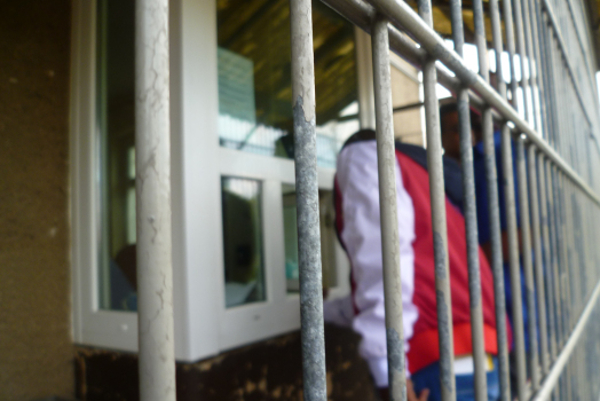Transcribed from the 1 July 2017 episode of This is Hell! Radio (Chicago) and printed with permission. Edited for space and readability. Listen to the whole interview:
We need to be building power in our communities, and first and foremost we need to be talking about what an autonomous, transformed society would look like. How do we get to a place beyond capitalism? How will we get to the place beyond patriarchy and white supremacy and colonialism as it exists today?
Chuck Mertz: No matter how well-intended liberals and progressives are, you’re getting your anti-Islamophobia all wrong. I know. Your heart might be in the right place, but if you think about it a bit, maybe your solutions aren’t. Here to help us better understand the fight against Islamophobia, live from Toronto, is researcher, writer, and campaigner S. K. Hussan, co-author with Azeezah Kanji of the ROAR Magazine article “The Problem with Liberal Opposition to Islamophobia.” He organizes as part of and alongside migrant and undocumented communities, including those targeted by the national security state.
Welcome to This is Hell!, Hussan.
S. K. Hussan: Hi, thank you for having me, Chuck.
CM: You write about the rise of a “militant xenophobia with a hatred of Muslims as one of its cardinal principles. At the same time, anti-racist organizers are also coming together, building our analysis, fortifying our ability to defend ourselves in the face of increasing and rampant bigotry, and mobilizing to turn the tide. Unfortunately, however, many of the arguments against Islamophobia in anti-racist circles turn out to replicate rather than subvert the underlying logics that attack, demonize, and dehumanize Muslims.”
Why does that anti-racism wind up mimicking Muslim demonization? Is it an attempt to sell or brand an anti-racist stance for those who are racist? Does trying to convert lead to speaking in a language that ends up reinforcing some aspects of what you are actually trying to turn people away from?
SH: I think that’s an important point, and we should start there. What we’re saying is that this is something that we ourselves, the authors of this piece, have done. Many people do it because it’s sometimes tactical or strategic to mobilize a particular kind of narrative or argument in order to win. So someone says, “These Muslims are illegal,” and you say, “No, in fact these are citizens who are being killed.” You want to reclaim that space. But what we’re saying is that we have to think things through, because would it be okay to attack and demonize Muslims simply because they are immigrants? That’s what the Trump line is. The Trump Muslim travel ban shuts out Muslims who are non-citizens. We don’t want to fall into the trap of replicating the entire structure.
When I talk here about the entire structure, I mean the judicial, political, socioeconomic, cultural system that’s premised on capitalism and colonialism (particularly in North America; we are essentially a colony) and that’s based on patriarchy. We don’t want to replicate those things when we’re making arguments to defend Muslims.
CM: So you think the problem, then, generally, is the focus on winning the argument and not providing the proper solutions to fight Islamophobia?
SH: One of the problems is people don’t have a full sense of what is happening out there. For example, people will say, “Okay, well, we should include other people in the definition of terrorism. Timothy McVeigh is a terrorist. All of these white supremacists are terrorists. So what we should do is expand the definition of what a terrorist is, and we shouldn’t just talk about Muslim terrorism.”
What we’re seeing there is the creation, as a legal category and as a political category, of the terrorist as something that we should fight against. But we shouldn’t be expanding that definition. We should be rejecting it. Because, among other things, the question of what a terrorist is, is essentially about who has more power. When the United States government (or the British government, or whatever government), through its thousand military bases, is carrying out invasions and assassinations, supporting coups, overthrowing governments, killing masses of people—that’s not because they’re “terrorists,” right? I don’t think we need to expand the definition to these particular kinds of acts.
As a friend of mine says, what terrorism is, is the unauthorized use of force. Who is the authorizing body here? And are we just accepting the existence and the moral legitimacy of these other so-called “authorized” acts of aggression? If we’re not, then we should not be expanding the definition of terrorism, we should be rejecting it wholeheartedly.
CM: Is the problem with the liberal or progressive reaction to Islamophobia that it is a reaction? That it is not taking the initiative? That it allows the rightwing Islamophobia to frame the discussion? Does the left need to take the initiative more in what was once called the “War on Terror” and quit reacting to what the right’s response is to it?
SH: This varies, of course, from region to region and place to place. We need to be building power in our communities, and first and foremost we need to be talking about what an autonomous, transformed society would look like. How do we get to a place beyond capitalism? How will we get to the place beyond patriarchy and white supremacy and colonialism as it exists today? Within that, we can have the conversation about Islamophobia. What is happening is all of these issues are being separated and we are not building mass movements that are able to take on the entire slew of our concerns, because this issue over here is a worker’s issue, over there it’s a prison abolition issue, and over there is another issue.
That, to me, is the fundamental issue: how are we going to build mass intersectional power that understands differences, doesn’t disappear them, and that obviously is led by the issues of the most marginalized in our communities? That, I think, is a key issue. It isn’t just focusing on the war on terror as its own piece. The war on terror is intrinsically connected to the war on drugs. It’s intrinsically connected to prison system, intrinsically connected to imperialism and capitalism, police brutality, wars abroad—this is one fundamental system and we have to be shattering it throughout. Without that kind of cohesive, connected approach, we fall into these other narratives.
This article is basically a series of these narratives. Most of my work is organizing people, so this is a theoretical, conversational, argumentative piece to push forward the arguments that we are seeing all the time.
What we’re seeing is the acceptance of this process of counter-radicalization, which is essentially a massive police operation, and I think we should really be confronting it. We should not talk about the expansion of counter-radicalization, we should instead get rid of it entirely.
CM: You cite a report released last February by the UN special rapporteur on counterterrorism and human rights, Ben Emmerson, who criticized the prevailing approach towards ‘counter-radicalization’ as conceptually flawed and ineffective, noting that “States have tended to focus on these areas that are most appealing to them, shying away from the more complex issues, including political issues such as foreign policy and transnational conflicts, preferring instead to emphasize religious ideology as the driver of terrorism and extremism.”
How much are concepts like counter-radicalization a way to approach Islamophobia without confronting issues like foreign policy that may be part of the problem? Is counter-radicalization a way that liberals can fight Islamophobia without challenging the problems with US foreign policy? I haven’t heard that many challenges from liberals on US foreign policy.
SH: Just one thing: I know the word ‘liberal’ was used a lot in the article, but our aim was broader than just at liberals; it includes progressives, even people of good heart. Secondly, CVE [“Countering Violent Extremism”] counter-radicalization initiatives have been spreading through the United Kingdom, the US, Canada, Australia—all of the English-speaking “Five Eyes” countries, the countries that work together on intelligence issues, as well as across Europe. And now there is counter-radicalization even in places like Pakistan, funded by the US government. All of them have this notion that there are these young people who are psychologically impacted, who are somehow in these particular socioeconomic conditions that allow them to be transformed in some way.
The way they work—I think it’s important to know how they work—is essentially a net of community spying initiatives. You put young people into rooms and you ask them to spy on and speak about their friends and their neighbors. You are asking them to speak about the way that they understand the world, and using them as a way to gather more intelligence.
And it individuates the issue. It is as if these are individual issues, psychological problems affecting some people. It incorporates, essentially, a vast group of Muslims into this idea that we are potential terrorists, we are to-be terrorists. But when Trump comes out and says they’re going to limit counter-radicalization to just Muslims, people say, “No, it should include everyone.” Well, no, it shouldn’t. This entire program is community policing. It’s essentially massive spying, it’s individuating the issues; it’s not confronting foreign policy, as you said, and it’s not understanding the ways in which individuals resist.
And what we’re seeing is the acceptance of this process of CVE, or counter-radicalization, which is essentially a massive police operation, and I think we should really be confronting it. We should not talk about the expansion of counter-radicalization, we should instead get rid of it entirely.
If we’re going to talk about the socioeconomic and political situations that force people or create the conditions for people to take up antisocial behavior in general, and that does include so-called terrorism, then that is talking about social transformation, it’s talking about moving beyond capitalism, patriarchy, white supremacy, homophobia, and colonialism.
CM: You also point out the liberal and progressive argument against Islamophobia that says inclusion is the answer. You write about the recent Royal Canadian Mounted Police decision to allow women wearing the hijab to join the federal police force, and how that, like inclusion of Muslim women in police forces throughout the West, as you’ve been saying, has been hailed as a positive move against the exclusion of Muslims.
But you point out that “the RCMP has its roots in the Northwest Mounted Police, the settler-colonial police force developed to surveil and attack indigenous communities. Racial and gender violence continues to pervade the everyday practices of the RCMP, and the presence of Muslims did not dampen the force’s deep-seated Islamophobia but was actually exploited to entrap vulnerable Muslims in false terrorist plots staged by undercover agents presenting themselves as Islamic authorities much in the same way that the FBI has done here in the US.”
To you, what explains why progressives would cheer the inclusion of Muslim women into the national security state, a national security state that they criticize and oppose? The same thing happened at the Democratic National Convention last summer when Khizr Khan, father of Humayun Khan, who died in the Iraq war twelve years earlier, was cheered on for his service. So why cheer inclusion of Muslims within policies that liberals and progressives supposedly oppose?
SH: At its core, we have an issue with this notion that inclusion of certain bodies either is transformation or is a sign of transformation, a sign of better things to come. Long ago our black elders taught us that we don’t need to see black faces in high places, we need a social transformation and a collective transformation.
Obama is the deporter-in-chief. Obama is the person who supports military invasions and expansion of the US empire. Simply because people are present who look a certain way, they will not be part of the transformation. When Khizr Khan was at the DNC, I actually wrote him an open letter saying this isn’t what we’re talking about. Yes, your son was lost. But your son did not die in a just war by any stretch of anyone’s imagination. Your son is actually part of an empire, so you are empire’s foot soldier, and that is something you need to contend with. That is your tragedy. Not that your son was killed. It’s that your son was killed in an unjust war that was constituted, created, ideologically produced, and he believed it, and now you too believe that this is the correct course of action.
The entrapment case mentioned, here in Canada, is the first time in North America that a supreme court has actually ruled that entrapment did happen (the FBI never gets convicted for entrapment, and they use Muslims who are vulnerable, so blatantly). But these people, some of them with severe mental health issues, were entrapped. The judge said it would not have been possible for them to carry out this so-called action. They were rented drones; they were provided maps and pressure cookers; they were provided endless sources of money to be driven around; and were repeatedly told that this is a version of Islam that says you must do this. And when the person in question actually said, “Look, I don’t believe this is the Islam that I want to follow, I want to get a separate Muslim opinion,” the Muslim RCMP agent moved him to a hotel so that he couldn’t get advice from anyone else. That is what the presence of Muslims in the RCMP does. This form of “inclusion” will not count for much in this situation.
Progressives and liberals, and in fact most people in the North, are simply not aware of the massive amount of poverty, injustice, and suffering that is taking place outside the boundaries of their own countries.
The other thing is that so often progressives and liberals assert that this is a signifier, that it’s a symbol of a broader shift in society, that a Latino judge or a South Asian judge or police officer or teacher or whatever is a signifier that our societies are changing. I think that can be assessed. We can talk about whether we think we’re moving away from an imperialist, colonial, hetero-patriarchal system, and if we are at war, and if these people are actual signifiers. Was Obama’s presidency a signifier? Have we seen a shift? Or was it about an expansion of rights for a slightly bigger group of people who mostly happen to be in the richer countries, while the rest of the planet continues to suffer? I would say that it’s almost always the latter.
This notion comes because progressives and liberals, and in fact most people in the North, are simply not cued in and aware of the massive amount of poverty, injustice, and suffering that is taking place outside the boundaries of their own countries. That allows this. But so what if a few more Muslims are part of these police forces, if so many more Muslims are still dying in Iraq, in Afghanistan, in Syria, in Yemen? Often being killed by proxies who happen to be Muslims themselves? It’s not a simple question.
CM: You mention the progressive and liberal argument that Islamophobia plays into the hands of ISIS, and how this argument too has its problems. Does Islamophobia lead more to the illegal and aggressive wars, extra-judicial drone killings, torture, secret detention, hate crimes, invasive state surveillance—does it lead to that more, or does it lead to people signing up for ISIS?
SH: Those aggressive wars are Islamophobia. It’s not that Islamophobia leads to them, but that that is one way Islamophobia expresses itself. This notion that this plays into ISIS’s hands—we see this all the time. Every time there is any major act of aggression, people will say we are pushing people. There is a number of things that are part of this analysis. Number one is that Islamophobia is not an organizing methodology but something that simply forces people into particular kinds of action; this removes it and makes it lower down on the scale of causes and effects. But no, Islamophobia is deeply embedded in this hetero-patriarchal capitalist colonial system which allows these wars of aggression within which ISIS exists. That is a very different idea.
What’s also happening there is this notion that people who are joining ISIS do not have their own capacity to think, that they are simply reactionaries; they are reacting to what is being done unto them; they are unthinking beings. This is a very hard idea. These people are in fact making decisions. And we can agree or disagree with those decisions, but we cannot dehumanize them.
If we say they are essentially like animals who have been attacked and now they’re fighting, they don’t have any rational thoughts of their own—this is a deep, long-term Orientalist idea. That’s something to be thought about and understood. Because the Kurds who are fighting ISIS do not see them as such. They see them as an active, rational, aggressive force that must be fought against, which is a very different idea than that these are madmen who are irrational and psychologically damaged. This is simply part of the narrative that Muslims are stupid and foolish and wild and uncontrolled, and that is something that has been part of the logic for many centuries. And people are repeating that in many ways when they say we’re pushing people into the hands of ISIS. That cannot be allowed.
CM: How much do you think the fight against Islamophobia by liberals and progressives unintentionally feeds into expanding the power of the state?
SH: All the time. Obviously this is not a dimension of just Islamophobia. If we talk about the fight for queer marriage in its current structure, whether we talk about many of these so-called police reforms within the current structure, many of the ways in which we are trying to make domestic reforms are expanding because the nation-state and capitalism are extremely adept at adjusting to political pressure. The entire ideological system—television, university education, mainstream media—is a collective system that shares the same ideals. So we have to be extremely thoughtful and analytical when we make our arguments and when we organize, particular in the ideas we use to organize people. We want to organize people into mass movements that are democratic and thinking through, among themselves, what kind of world they want to build, and then build it.
But at this stage, much of the discussion and debate is outside of that, so capitalism in its ideological form as well as its practical form is simply able to subsume and metabolize dissidence. That is the way that neoliberal democracy works, is that it allows a particular kind of dissent within it as long as it does not fundamentally challenge the nature of society itself. That’s what liberalism is.
So of course that is also happening with anti-Islamophobia. All of the arguments that we’ve discussed do that.
CM: You write about the Islamophobia of liberal governments like Obama’s, or Trudeau’s in Canada. How much of an anomaly, then, is Trump’s Islamophobia?
SH: Trump’s policies are a manifestation, a continuation, and an expansion of the US empire. But obviously there are all kinds of things happening when he speaks that give power to racist, rightwing fringe elements to carry out the things they always wanted to do. Trump has upped the ante on that end.
But in many other ways he is extremely unpredictable; he has said that he will limit power and that he will not intervene as much in other states, which should mean that he will not expand imperialist wars of aggression. However, his policies don’t match up with that. It continues to expand. So to me, Trump is an expansion of what has been happening around the world, a very specific form of radical populism. Trump at the bully pulpit is giving permission to racist, rightwing elements to speak out.
What we need to understand is there are very different things happening. Trudeau, Obama, Macron in France are very different centrist pieces. There’s the Bernie phenomenon, the Corbyn phenomenon—and before that Podemos and Syriza—the left phenomenon that’s taking place. Then there is Trump and all of his cronies, this right wing. But we’re in this very interesting moment where there is a crisis in politics, and instead of saying, “Is this an anomaly or not?” we ask what the historic and ongoing role is of these deep-seated, long-term processes like capitalism, colonialism, hetero-patriarchy, white supremacy—how are we going to fundamentally build movements that not only challenge them, not only challenge every single policy (and they should do that, we need that), but at the same time build the power to transform completely everything we’re facing?
That really makes us step out of this Trump-centric chaos, and start thinking (or continue thinking) in a long-term fashion.
CM: Hussan, thank you so much for being on our show this week.
HS: Thank you for having me.

